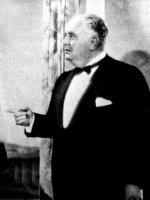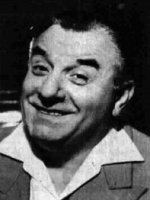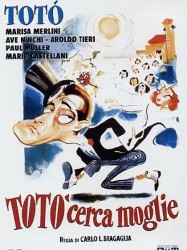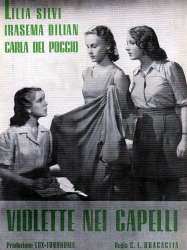Une nuit avec toi est un film italien de genre Comédie réalisé par Carlo Ludovico Bragaglia avec Irasema Dilián
Une nuit avec toi (1943)
Fuga a due voci

Si vous aimez ce film, faites-le savoir !
Une nuit avec toi (titre original : Fuga a due voci) est un film italien réalisé par Carlo Ludovico Bragaglia, sorti en 1943.
Acteurs

Irasema Dilián

Guglielmo Barnabò
(L'industriale Santelli, suo padre)

Aroldo Tieri
(Piero, lo spasimante di Maria)

Paolo Stoppa
(Fogliatti, il produttore)

Carlo Campanini
(Il conte Matteo)
Commentaires
Postez un commentaire :
Suggestions de films similaires à Une nuit avec toi
Il y a 133 films ayant les mêmes acteurs, 31 films avec le même réalisateur, 40700 ayant les mêmes genres cinématographiques (dont 2858 ayant exactement les mêmes 2 genres que Une nuit avec toi), pour avoir au final 70 suggestions de films similaires.Si vous avez aimé Une nuit avec toi, vous aimerez sûrement les films similaires suivants :

Totò cerca moglie (1950)
Réalisé par Carlo Ludovico Bragaglia
Genres Comédie
Acteurs Totò, Ave Ninchi, Marisa Merlini, Aroldo Tieri, Paul Müller, Mario Castellani
Note62%





En 1950, l'énergique et déterminé tante Agata, qui vit en Australie, fatiguée de la vie de Bohème que conduit son neveu Totò, sculpteur d'avant-garde à Rome, essaye d'y remédier en le faisant épouser sa pupille Adelina. Pour cela, elle envoie une photo de la jeune fille dans une lettre dans laquelle elle informe Totò de sa décision et où elle annonce qu'elles vont lui rendre visite prochainement. Mais, par erreur, la photo envoyée est celle de la très laide femme de chambre d'Agata : ainsi Totò est confronté au choix entre se marier contre sa volonté ou renoncer à la rente de la tante.

Totò cerca moglie (1950)
, 1h14Réalisé par Carlo Ludovico Bragaglia
Genres Comédie
Acteurs Totò, Ave Ninchi, Aroldo Tieri, Paul Müller, Mario Castellani, Luigi Pavese
Note62%





In 1950 in Australia Aunt Agatha writes to Toto, informing him not to send him in Italy even a penny until he is married. Toto is in fact a great bachelor who dabbles in sculpture and live in luxury with the money of her aunt. Now Toto is threatened and forced to be with a woman just because Aunt would soon come to Rome to meet the new couple. Thanks to a friend (Aroldo Tieri) Toto is helped but the women that gives him are horrible or are already ammogliate, which causes many misunderstandings. At the end bull is mistaken for a delinquent because of mistaken identity and misunderstanding continues when they come into the house of Toto's aunt and the new "wife", or a woman who is made to pay for pretending to be his wife Toto.

Figaro qua, Figaro là (1950)
, 1h24Réalisé par Carlo Ludovico Bragaglia
Genres Comédie
Acteurs Totò, Isa Barzizza, Gianni Agus, Guglielmo Barnabò, Renato Rascel, Jole Fierro
Note64%





The protagonist of the film, set in 1700, is Figaro, the barber of Seville, which is likely to be arrested because although there is a ban opens his shop on Sundays. Figaro is a friend of a nobleman who fell in love with Rosina, her friend and daughter of the governor. But the father of Rosina does not agree to their marriage. One day Rosina, by her maid Dove manages to tell the Count that one night staying at the inn "of four bulls." Then the Count and Figaro with a friend of hers to the inn before they get Rosina and his court. Their plan is to replace the host, pose as their owners of the inn and abduct Rosina. But unfortunately not all is according to plan. In fact, Pedro, dangerous bandit, he learns that Rosina and his court must stay at the inn that night and his men raided the inn: they dress all by hosts and make prisoners Figaro, the Count and his friend. Then finally comes Rosina remains very disappointed when he sees that his beloved is not there. Figaro, however, has an idea: he writes a note and puts it in OCA that will bring to the table, where it says that the man in the white hat is Pedro. Unfortunately at that time the white hat's got Figaro and Pedro, so the soldiers Figaro stop believing that it is Pedro and the plan fails. Figaro is sentenced to death by firing squad, but in the end manages to escape helped by count. Eventually, after many vicissitudes, Count riece to marry Rosina and, after marriage, Figaro goes to live with them.

Un cattivo soggetto (1933)
, 1h3Réalisé par Carlo Ludovico Bragaglia
Origine Italie
Genres Comédie
Acteurs Vittorio De Sica, Giuditta Rissone, Laura Nucci, Guglielmo Barnabò, Egisto Olivieri, Amelia Chellini
Un jeune homme, qui mène une vie désordonnée, tombe amoureux d'un belle étrangère, rompant ses fiançailles avec une fille de noble famille. Entre difficultés et malentendus, jalousies et querelles, le jeune homme finit par épouser la jolie étrangère.

Non ti pago! (1942)
, 1h12Réalisé par Carlo Ludovico Bragaglia
Genres Comédie
Acteurs Eduardo De Filippo, Titina De Filippo, Peppino De Filippo, Vanna Vanni, Paolo Stoppa, Vasco Creti
Note70%






Violette nei capelli (1942)
Réalisé par Carlo Ludovico Bragaglia, Steno, Leo Catozzo
Origine Italie
Genres Drame
Acteurs Lilia Silvi, Irasema Dilián, Carla Del Poggio, Carlo Campanini, Steno, Marino Girolami
Note59%





C’est l’histoire de trois amies d’enfance, Carina (Lilia Silvi), Oliva (Irasema Dilián) et Mirella (Carla Del Poggio), qui se sont jurées de toujours s’entraider dans la difficulté.

47 morto che parla (1950)
, 1h29Réalisé par Carlo Ludovico Bragaglia
Genres Comédie
Acteurs Totò, Silvana Pampanini, Carlo Croccolo, Aldo Bufi Landi, Tina Lattanzi, Adriana Benetti
Note69%





The story is set in a small town near Naples early 1900. Baron Antonio Peletti is a stingy and cruel man who thinks only to spend the bare minimum needs for his son and future daughter-in-law, even if he lives in a luxurious house. The servant Contrado is forced to go hungry because of that miser, in fact every time that Antonio has to spend even a penny to buy something complained of unnecessary waste, exclaiming: "And I pay, and I pay!!" But one day his grandson who want to steal the box full of gold coins Antonio, hide under the bed has a way of revenge. But in order to steal the tape, the grandson needs the complicity of all higher institutions in the country, including the mayor, one of the most bitter enemies of Antonio. In fact, the man wants to build a primary school for the children of the village, but the cruel Antonio prevents the funding because they do not want to throw out a penny!. So the pharmacist really wants to deceive Antonio with a sleeping pill into believing that it gave him to drink a poison accidentally. Antonio bait this trap and believed to be in Hell, really desolate set up by the villagers, and then the hairs Baron finds a soul who persuades him to donate money to the mayor of the box to set up the school. Only then Antonio would be redeemed from their sins in the past and would go to the Paurgatory. However, during the operation something is wrong and Antonio realizes the trap of the villagers. The nephew not to lose money steals the cassette and runs away in a balloon with his girlfriend but Antonio joins him and the three hovering in the air. But due to a failure of the balloon starts to descend towards the sea and so must lighten it; Antonio will be forced into tears and throw away his box full of gold coins. He is now supposed to be sunk somewhere near Sardinia, but at the end of the story the baron, coming back from the island on a monkey in the very day of inauguration, eventually understands his mistakes and accepts to finance the project of founding the school.

Una bruna indiavolata! (1951)
Réalisé par Carlo Ludovico Bragaglia
Genres Comédie
Acteurs Silvana Pampanini, Ugo Tognazzi, Nando Bruno, Rocco D'Assunta, Luigi Pavese, Virgilio Riento
Note62%






L'eroe sono io (1952)
Réalisé par Carlo Ludovico Bragaglia
Genres Comédie
Acteurs Renato Rascel, Delia Scala, Marisa Merlini, Arturo Bragaglia, Enzo Biliotti, Francesco Golisano

Totò le Moko (1949)
, 1h16Réalisé par Carlo Ludovico Bragaglia
Origine Italie
Genres Comédie
Thèmes Mafia, Gangsters
Acteurs Totò, Gianna Maria Canale, Carlo Ninchi, Carla Calò, Elena Altieri, Marcella Rovena
Note67%





À Alger, lorsque le chef des gangsters Pépé le Moko est tué par la police, ses fidèles sbires lui cherchent un remplaçant. Ils le trouvent en la personne d'un de ses cousins napolitains, un musicien ambulant nommé Antonio Lumaconi. Ce dernier s'appelle désormais Totò le Moko et il devra, malgré ses gaffes, diriger les associés mafieux de son parent lointain.
 Connexion
Connexion